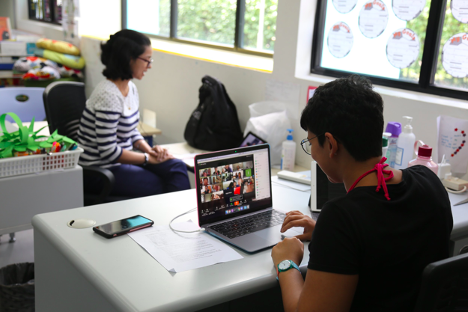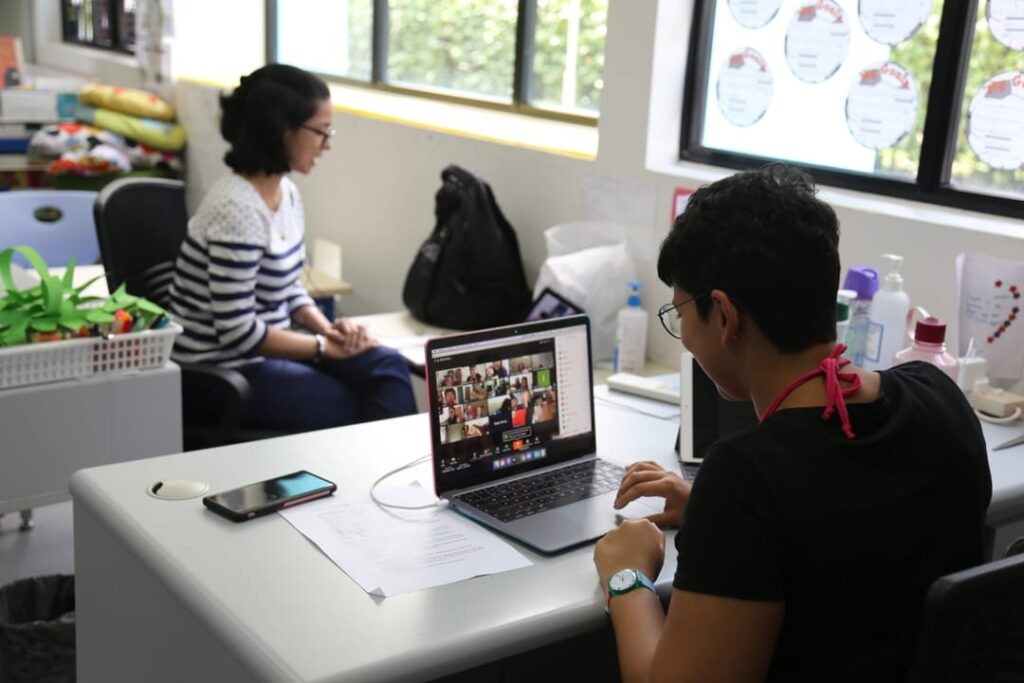As schools have closed amid the COVID-19 pandemic in 2020, families have made the change to virtual learning at home. With video capabilities, online instruction seems to closely simulate what would normally be happening in the classroom, but there are some subtle differences. Here’s a more in-depth look at e-learning versus in-class learning.
The Teacher’s Role
Whether learning takes place online or at school, teachers play a pivotal role in empowering students to gain confidence and discover new concepts. They are constantly analysing and adapting their learning techniques while monitoring how students are progressing. However, in-class learning and e-learning are two different learning models that naturally demand some variations in the teacher’s role.
Even though we refer to these professionals as teachers, an educator’s role is actually to facilitate the learning. Teachers rarely spend more than 2.5 hours of a typical school day providing direct instruction; the majority of the time is spent guiding effective use of learning time in the best interests of every single, individual student. They always ensure that students are getting the most out of every part of their day, whether this is academically, physically or emotionally.
So, what does this really look like? An effective educator:
● Provides fun, innovative activities to engage students, hold their interest and keep them focused. They make learning fun, create a passion for gaining knowledge and ensure that they are continually developing their skills.
● Monitors every child to maintain the emotional balance necessary to allow learning to happen. An unhappy child is not a learning child. Children must crave learning and feel confident in doing so.
● Motivates students with praise and constructive, positive feedback to maintain their self-esteem and to nurture their self-confidence in themselves as a unique and successful learner. This also teaches students how to support others and to encourage their peers with positive feedback.
● Helps students to build their socio-emotional skills to build strong relationships with their friends and the adults, and to feel a sense of belonging to the learning community. At all times, keeping communication channels with their families and friends open is extremely important for students’ consistent development.

The Parent’s Role
In this unusual situation of e-learning, the teachers are finding new ways of engaging their students, nurturing their students and guiding their students to learn. They are adapting their teaching methodologies, and need a deeper, shared responsibility with the parents. The relationship between the teacher and parent is always important, but in an e-learning model, it takes on new meaning.
Parents are in the driving seat of their child’s emotional balance, their physical environment and being ready to learn at a physiological level. They need to create a positive learning experience and ensure that they are taking their child’s personal needs into consideration.
The parents are the decision-makers for allowing their child to take a learning break (as a teacher would do in the classroom). Parents are managing their child’s behaviour when learning becomes too challenging and re-regulating them back to emotional stability (as the teacher would do in the classroom). Parents are providing ongoing praise and motivation for learning to continue (as teachers would in the classroom).
Parents may feel overwhelmed with these additional responsibilities with supervising online learning, especially when also working from home. It is therefore important for parents to communicate with the school if they are finding the situation difficult. It is well-accepted that being at school is the ideal setting for teachers to facilitate learning, and e-learning can never be a long-term substitute. The hope is for students to be back in school as soon as possible, but until that is a safe and sensible option, everyone must work together to make e-learning as positive as possible.
The Role of Technology in the Learning Process
While e-learning does not provide the full advantages of in-person learning, the importance of technology in promoting learning should not be dismissed. At OWIS, we integrate technology into most aspects of the curriculum. Students regularly use electronic devices for research, presentations and other projects. They are used to having access to this technology and are always developing their skills while in the classroom. They are able to learn through doing and try out different types of software and applications.
Our goal is to instil in children an understanding of how to use technology responsibly. They must also understand the risks associated with the online world and are educated on safe internet and technology use. Students need to feel comfortable using technology and be able to make the right choices ready to pursue further study and career opportunities in later life. They must also understand that technology is not the answer for everything, and often the ‘old’ way is the best way. They must not be reliant on technology as there will be times when it is not accessible.
E-Learning at OWIS
While OWIS recognises that in-school learning is the most optimal setting, we have been particularly mindful when designing our e-learning programme to include key elements of our on-campus programmes. We try to recreate as many learning opportunities as possible and adapt the opportunities that the students usually get at school.
Balanced learning
When students are on campus, they have access to well-rounded learning opportunities, with a balance of academics, extracurricular activities and time to interact with their peers. With e-learning, we have intentionally maintained that balance with recreational lessons such as PE, as well as daily opportunities for pastoral care through our Secondary Tutor time and Early Childhood and Primary social check-in time via live Zoom sessions. These sessions allow students to maintain their friendships, to converse at a social level with their peers and to maintain their pastoral relationship with their teachers.
Mindfulness
At the end of each school day, as teachers check in with students for a wrap-up and feedback Zoom session, they may also conduct mindfulness or wellness activities to boost students’ morale. At OWIS, we understand that with the many changes associated with this pandemic, our students will be processing questions and concerns which may impact on their concentration and learning. They may also be missing the security and comfort of their classroom and the nurturing environment they are accustomed to at school. Their routines may be severely disrupted and there is the potential that they find the situation of studying at home difficult or stressful. These feelings could be down to a range of reasons, so taking the time at the end of the day to reflect and reorganise their feelings and emotions through mindfulness practices has extremely positive effects on the students.
Building relationships and fostering kindness
Remote learning can sometimes feel isolating and lonely. Therefore, we have deliberately allocated time throughout the school day for students to catch up with their peers to maintain their friendships. It may be the case that some students have returned to their home countries, so they feel out of touch. It may be that they haven’t been in Singapore for long, so they are still in the process of making new friends and building relationships with their teachers.
These interactions allow our students to demonstrate kindness to each other, to listen, to advise and to empathise. It also ensures that all students know that they have others who they can talk to and it helps them feel confident in reaching out for support. They learn to understand that everyone will have different experiences of a situation, so they must be able to be compassionate at all times.
Communication with parents
OWIS also recognises that e-learning is an entirely new arena for many parents, and we aim to provide guidance to support them in taking advantage of the e-learning provision for their child. We provide a day by day schedule complete with resources needed for their child to engage with all the activities, and we make excellent use of our learning platforms, Seesaw and Managebac to allow our students to be as independent as possible while keeping parents well informed of their child’s e-learning day. This helps to make it easier for parents to plan their day, especially if they are working as well. It may be that they decide to schedule breaks in their day to help their child with an art project, or that they put the time in the diary to do the PE session together.
At OWIS, we are committed to making e-learning successful – to providing fun and engaging learning opportunities, to providing the right level of challenge for learning to take place and for ensuring that those wonderful, “aha moments” continue – that moment when a child suddenly understands, when a new concept or skill clicks into place is when learning happens. And learning happens all the time – whether at home or in school – whether in the classroom, participating in virtual lessons or helping out around the home.
Most importantly, the crucial and fundamental ingredient of being a self-confident and successful learner is the depth and strength of the relationships the child has with their teachers and significant adults in their lives. They must want to learn from others to develop their knowledge and skills. They must feel confident in asking for help when needed and feel supported in whatever situation they are in.
In the e-learning domain, we make sure our students maintain their relationships with their teachers every day through live Zoom lessons, by individual opportunities to interact for feedback, by times for socialising and, of course, they have the privilege in these unusual times, to be with their parents too. The teaching staff always have their students’ best interests at heart and they are working around the clock to ensure that this transition and subsequent journey through e-learning is as smooth as possible. They continue to monitor their students’ academic, physical and emotional progression and offer support whenever needed. They encourage students to take ownership of their learning, be innovative and manage their time successfully. Even though the roles of parents and teachers have shifted, we all still have the same goal – to promote every child’s success.
For more information on how we foster student’s learning both in school and at home, please get in touch with us.














